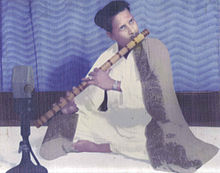This article needs additional citations for verification. (May 2013) |
Pandit Raghunath Prasanna (1913 – 6 June 1999) was an Indian classical shehnai and flute player. He was known for using the techniques of shehnai in flute playing inspired by vocal music.
Raghunath Prasanna | |
|---|---|
 Raghunath Prasanna at All India Radio | |
| Background information | |
| Born | 1913 |
| Died | 1999 (aged 85–86) |
| Genres | Indian classical music |
| Occupation | Instrumentalist |
| Instrument(s) | Bansuri, shehnai |

Personal life and family
editRaghunath was born in 1913 in Varanasi in the state of Uttar Pradesh.
He was married to Saraswati Devi. They had seven children, Pandit Ravi Shankar Prasanna (Flute and Violin player), Pandit Rajendra Prasanna (flute and shehnai player), Pandit Rakesh Prasanna, Omkar Prasanna. Raghunath Ji's seven grandsons are in the field of music playing bansuri. Rajesh, Rishab, Ritesh, Rajat, Rohit, Rajeev and Rohan Prasanna are taking ahead the great legacy.
Career
editRaghunath Prasanna got his musical training from his father Gauri Shanker, a shehnai player, and from Dauji Mishra from Varanasi. He was the first person in the family to introduce the art of flute (tripura bansuri and Krishna bansuri) in the family tradition, known until then for shehnai playing.[1]
At an early age, Prasanna worked as a Staff Artiste at various All India Radio stations, including Lucknow, Allahabad and Ranchi. Afterwards, he attended Banaras Hindu University and eventually received a seat in the Song and Drama Division of the Government of India.
Raghunath was also known for playing Tripura and Krishna bansuris.
His techniques have been adopted by his younger brothers and disciples Vishnu and Bholanath Prasannas, his sons Rakesh and Rajendra Prasannas, Niranjan Prasad, and Bhanu Majumdar and Ronu Majumdars.
Alain Daniélou has recorded his shehnai and tripura bansuri on the album Anthology of Indian Classical Music in 1955.
Prasanna received the Sangeet Natak Academi Award (1996).[2]